Black Friday: Boxing Day sales come early?
- Published
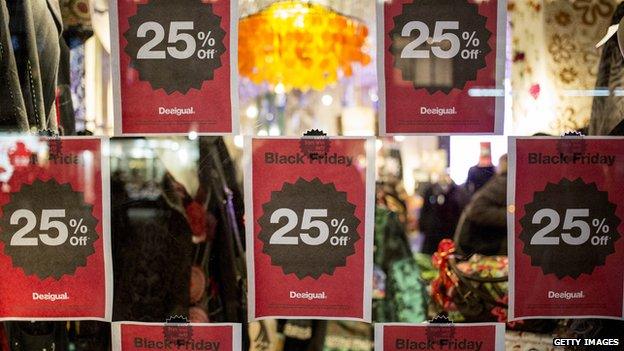
On Friday, the UK's largest retailers are expecting thousands of people to descend on their stores to pick up a bargain.
Black Friday, the big sales day in the US that follows the Thanksgiving holiday, is being adopted by more and more shops in the UK.
It was brought over by online store Amazon four years ago as internet shoppers noticed the US got the best deals.
"The global nature of the internet means the best deals can't be kept in America," says Nick Bubb, an independent retail analyst.
Most offers will be on electrical goods such as TVs, tablets, kitchen gadgets and audio hardware, he says, as electricals are often where shops can get the best deals from suppliers.
Beat Boxing Day
In the UK, Black Friday has been led by "the three As," says Mr Bubb: Amazon, Apple and Wal-Mart's Asda.
And this year is likely to see the biggest Black Friday sales yet as more people know about the event and more shops participate, say analysts.
Tesco says it expects Black Friday to beat Boxing Day sales in 2014 as it prepares discounts of as much as 70%. Its 24-hour stores will begin selling a minute after midnight, and more staff may be laid on in some areas.
This year rival Sainsbury's will enter the fray with 485 stores taking part, while Asda says it will be using the buying power of its US-based owner Wal-Mart to bring more bargains to UK shoppers.
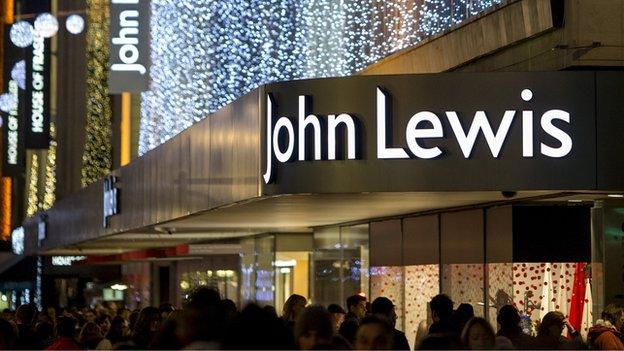
John Lewis will add staff to cope with expected demand in its stores
Department store John Lewis says it will put on about 100 deals and will add staff at its main distribution centre and in stores.
"Following steady growth over the last few years, Black Friday really emerged in the UK in 2013, when we saw the day break our previous records for a single day's online trade," says Mark Lewis, online director at John Lewis.
According to a Visa estimate, spending on Black Friday in the UK will be up 22% on last year with £1m spent on its cards every three minutes on the day.
'Finite pot'
A product of this Christmas sale in November is lengthening the shopping season, says Jacques de Cock of the London School of Marketing.
"Ultimately, customers only have a finite pot of money," he says, but purchases made sooner rather than later mean "people will forget" what they've spent, so shops are trying to lengthen the shopping season.
Another reason for this early sales event is its part in the game of chicken played between shops and shoppers, says Clare Rayner, founder of the Support for Independent Retail campaign.
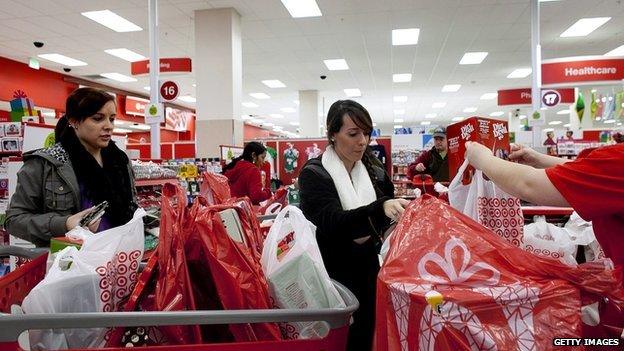
Customers and shops are in an annual game of chicken, says Clare Rayner
Customers have money to spend and want to buy gifts, which the retailers know.
On the other side of the coin, shops need the festive period to be a profitable one to keep shareholders happy or merely to survive, which consumers know.
This has previously meant customers being prepared to wait and wait for the best deals to arrive, knowing shops will eventually blink and offer them a bargain for fear of losing their custom to a competitor.
Now shops are adopting this American tradition of a pre-Christmas sale period to capture those sales.

Black Friday in the US
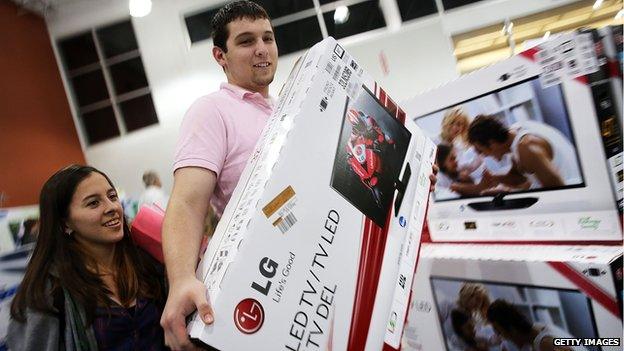
Black Friday kicks off the Christmas shopping season in the US
It became the biggest shopping day of the year in the US in 2001
But recent years have seen stampedes in stores
Four people have died and 56 injured in Black Friday incidents since 2006

Small Business Saturday
But what about smaller competitors?
Ms Rayner says independent shops will soon have to start planning for next year if they want to offer discounts comparable to their larger peers, because of the planning and negotiating that will be necessary.
Smaller shops are trying to import the US answer to Black Friday for independent shops - Small Business Saturday - which is proving challenging, she says.
"Some local councils are offering free parking on the Saturday but some shops don't even know it exists to encourage customers in... getting it together is difficult."
She adds: "If independent retailers want to have a part in Black Friday they will need the budget."
Doing cheap deals means giving away profit margin, which is a gamble, she says.
Many of the deals for the retailing giants will be supplier-funded, says Ms Rayner.
This means a big store company will have agreed a promotional deal with a supplier, such as a TV manufacturer. That can help the manufacturer gain market share at the expense of the competition, but it saddles most of the risk, rather than the retailer.
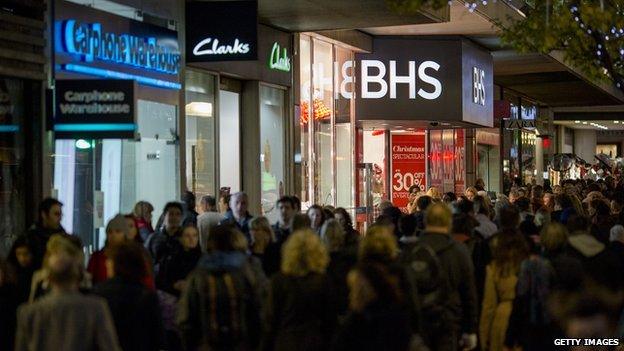
According to a Visa estimate, spending on Black Friday will be up 22% on last year
As for shoppers, there are some tricks to be aware of, says Mr de Cock of the London School of Marketing.
He says retailers are relying on Black Friday's fleeting nature and so-called flash sales to get shoppers to buy.
"Buy now or regret - getting consumers to trick themselves" is part of the gambit, he says. "It encourages more spontaneous purchases with less thought."
His advice: "Don't buy it just because it's discounted."
Full price?
Consumers should also beware of companies using it as a good way to dispose of end-of-line products, particularly in technology, he says.
And they should also realise that the UK discounts on most products don't come close to the discounts available in the US, where 70% cuts are more commonplace.
Mr de Cock says Amazon may be the biggest winner on the day because they have the most experience.
For analyst Nick Bubb, shops also need to be careful about how many sales they run. "The biggest problem is no-one will want to buy full price ever again."
- Published29 November 2013
.jpg)
- Published6 November 2013
